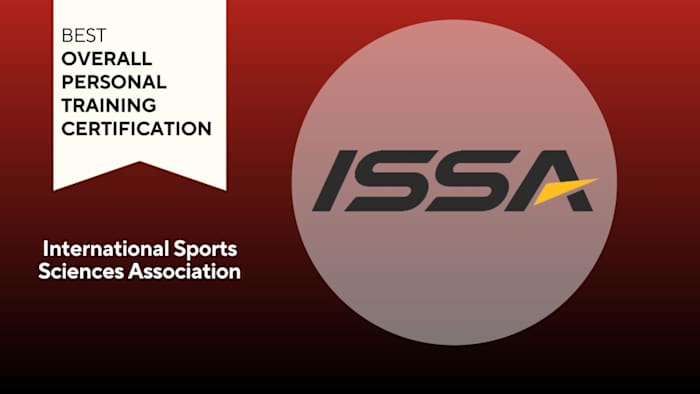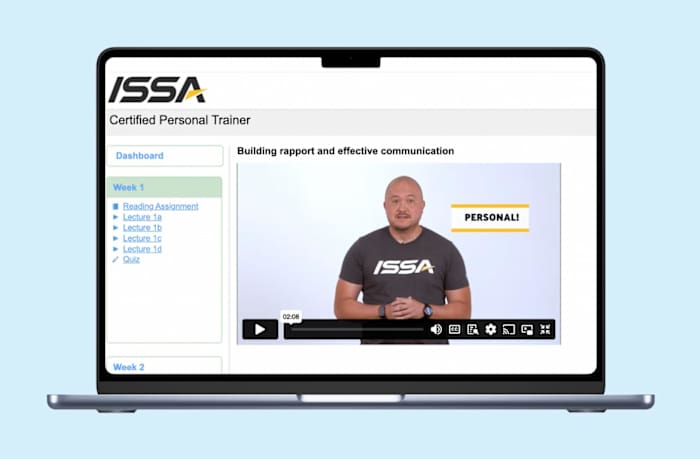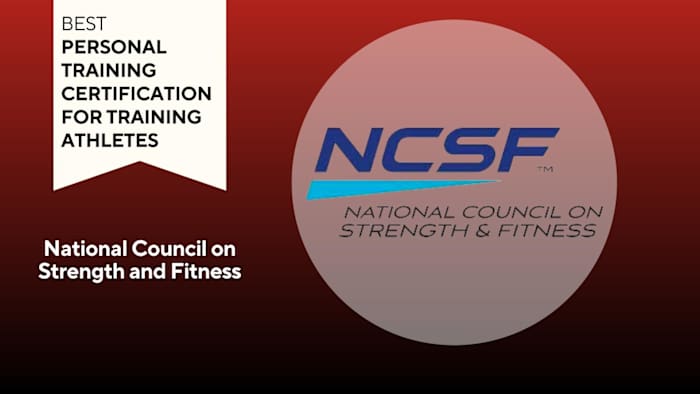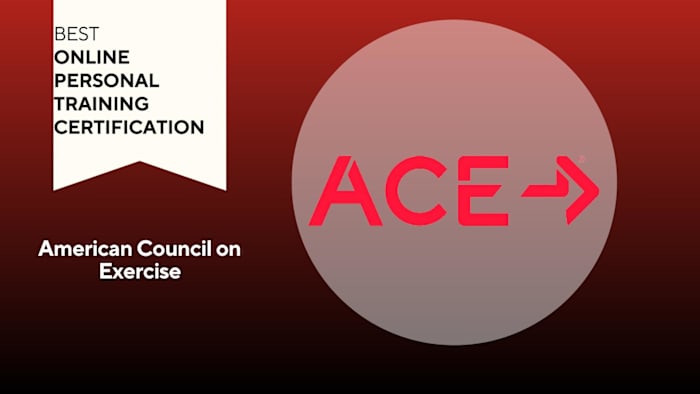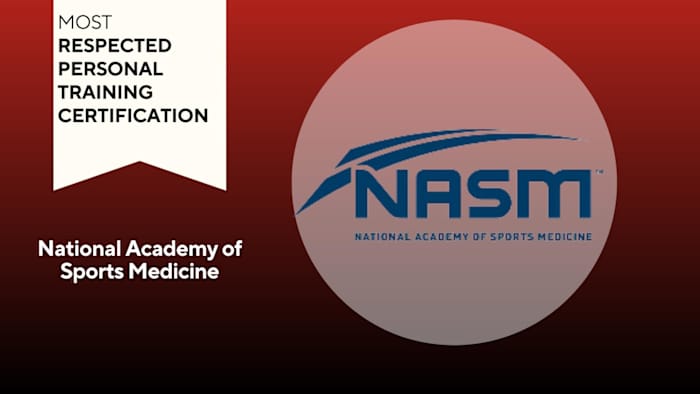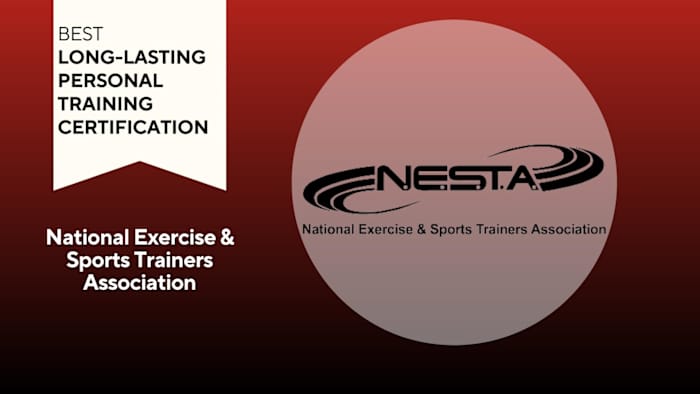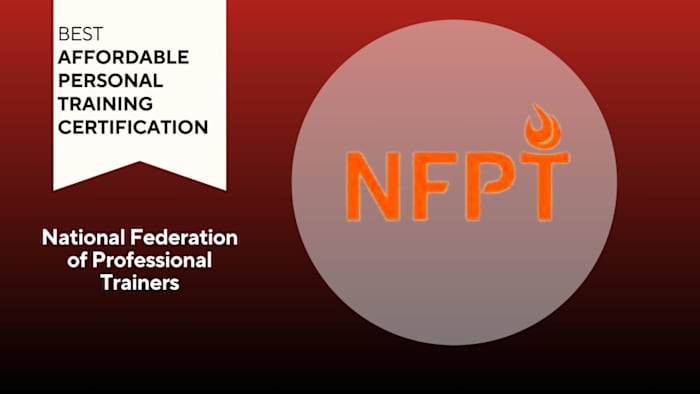The products featured in this article have been independently reviewed. When you buy something through the retail links on this page, we may earn commission at no cost to you, the reader. Sports Illustrated editorial staff are not involved in the creation of this content. Learn more here.
Whether you are newly considering a career in the fitness industry or continuing your education in how the human body functions, a Personal Trainer Certification is a necessary step to provide you with the education and accountability that you need to get hired. While there are tons of personal training apps and high-end gym memberships to choose from, there’s nothing quite like getting personalized advice from a trained fitness professional to help you reach your full potential. Plus, the fitness industry just keeps growing, and the need for more personal trainers is ever-present.
Becoming a Certified Personal Trainer (CPT) requires only some time, money and the internet, but that doesn’t mean the choice is easy. Each program varies in price, content, time and specializations, making it difficult to determine which one is right for you. To help you choose, we gathered up the top five personal training programs and reviewed them. Read on to find our reviews of each program as well as some insight on how to choose the best personal trainer certification program for you.
Our Picks for the Best Personal Training Certifications in 2024:
- Best Overall Personal Training Certification: ISSA
- Best Personal Training Certification for Training Athletes: NCSF
- Best Online Personal Training Certification: ACE
- Most Respected Personal Training Certification: NASM
- Best Long-Lasting Personal Training Certification: NESTA
- Best Affordable Personal Training Certification: NFPT
- Best App to Work With A Personal Trainer: Future
Best Overall Personal Training Certification: ISSA
- Price: $999 ($83.25/month)
- Course Length: Must be completed within 6 months, but can be done as quickly as 10 weeks
- Online or In-Person: Online
- Accreditation: Distance Education and Training Council (DETC)
- Exam cost: Included in price
- Exam pass rate: 90 percent
International Sports Sciences Association (ISSA), was founded in 1988 by fitness experts and exercise scientists who saw a need for standardization and credibility in personal training. This certification is conducted online and it covers a wide array of fitness topics including anatomy, physiology, kinesiology, biomechanics, health, nutrition, physical fitness and general fitness. You also get access to a specialized training course on bodybuilding, online coaching or corrective exercise.
"I was really pleasantly surprised by the amount of real-time support offered by ISSA,” says writer Emma Witman, who has been taking the Certified Personal Trainer course. “The twice-weekly office hours are literally more face-time with instructors than I received going to graduate school online. They’re incredibly patient and warm about answering any and all questions, even running overtime to get to everyone.”
Related Post: ISSA Personal Training Certification Review
The ISSA has one of the highest pass rates at 89.9 percent, and it also offers a six-month job guarantee or full refund if you are still unemployed in the fitness industry once six months have elapsed post-certification. The test itself is made up of 160 questions with no time limit, so it’s great for those that don’t do well under pressure—no need to relive the trauma of standardized testing! Once you pass, it will require a recertification every two years (which will cost $99) and 20 hours of CEUs (continuing education units).
Pros:
- Low stress testing
- Gives a broad base of general fitness training
- Offers specialization courses
Cons:
- Somewhat expensive
- To get an NCCA accreditation you must take an additional exam
Best Personal Training Certification for Training Athletes: NCSF
- Price: $479 to $699
- Course Length: 2 to 6 months
- Online or In-Person: Online
- Accreditation: NCCA
- Exam cost: Included in price
- Exam pass rate: 70 percent
If you know your dream career lies in training people in the gym or those with a background in athletic performance, the NCSF, National Council for Strength and Fitness certification, is for you. NCCA-accredited, this is one of the newer certification courses with a heavier focus on training athletes. Compared to other exams, this has one of the higher pass rates (70 percent); the exam can be taken online or in-person, is 150 multiple-choice questions and participants are given three hours to take it (though many report they didn't need that much time). Price for the course can vary based on what sort of materials you opt to receive when signing up, but is moderately priced regardless of which package you choose.
Pros:
- Affordable options
- High pass rate
- Good for those with training athletes in mind
Cons:
- Not the most popular or respected option
Best Online Personal Training Certification: ACE
- Price: $599
- Course Length: 3 to 6 months
- Online or In-Person: Online
- Accreditation: NCCA
- Exam cost: Included in price
- Exam pass rate: 65 percent
If you aren’t ready to drop over $1,000 on a certification program, there are cheaper options out there. The ACE certification costs only $599 and is a great option if you are looking for an education that gives you a great base in the overall fundamentals of health and fitness. The test has a total of 150 questions, with three hours to complete it and a pass rate of 65 percent. The good news: If you fail the first time you are able to retest for only $119.
Though this course doesn’t offer any particular specialization, it is great for those looking to be a general fitness trainer as it follows the IFT training module which includes information on all topics of fitness. Since it doesn’t delve too deep into specifics, this is a great entry-level course for those that may not have a thorough or very developed background in fitness.
Pros:
- Affordable price
- All online course
- Great entry-level course
Cons:
- May be too general for some professions
Most Respected Personal Training Certification: NASM
- Price: $899
- Course Length: 10 weeks
- Online or In-Person: Online
- Accreditation: NCCA
- Exam cost: Included in course price; retest vouchers are $199
- Exam pass rate: 64.3 percent
Though any CPT certification program proves you are a qualified personal trainer, the National Academy of Sports Medicine (NASM) is the gold standard course, and arguably one of the most respected. Unlike many courses which provide a broad but somewhat shallow fitness education, the NASM focuses specifically on corrective exercise technique methodology. This method of teaching provides more science on how movement affects the human body, and focuses on the pillars of strength, power and stabilization to help individuals reach their peak fitness while preventing injury.
Related Post: Is the NASM Certified Personal Trainer Course Right for You?
This course is also known for being one of the most challenging, and has earned its reputation of producing some of the best CPTs in the business. Though it has only a 64.3 percent pass rate, you are able to retake it more than once—though there will be retake fees and increased waiting periods after each failed exam. It has a bunch of practice quizzes that you can take before the real CPT exam for some in-depth review to help you pass.
Pros:
- Allowed multiple retakes
- Most scientific education
Cons:
- Can be difficult to pass
- Does not provide as broad of a fitness education as others
Best Long-Lasting Personal Training Certification: NESTA
- Price: $349
- Course Length: 1 to 3 months
- Online or In-Person: Online
- Accreditation: NCCA
- Exam cost: Included in course price; $199 to retake proctored
- Exam pass rate: 71 percent
While most CPT certifications will require you to reapply for your certification after two years, the NESTA only requires you to re-certify every four years. This is not only more convenient, but also more affordable as every renewal will cost you $149—not to mention that the overall cost is less than most other CPT programs.
The NESTA program focuses heavily on the use of technology and fitness tracking to help train clients, which is a bit out of the norm for most programs, but can be useful as classes like Orangetheory and the use of wearable fitness trackers grow more popular. The program also allows for you to choose unique specializations (such as MMA or triathlon) which can help you get a job in the specific sport or field you are interested in.
The program comes with a study guide and well-designed study program to help you ace the certification course. The final exam has 120 questions to be answered in 125 minutes, so you will have to use your time wisely to make sure you finish. This exam does have a slightly higher pass rate at 71 percent, so if you prepare properly with practice exams, a passing grade is well within reach.
Pros:
- Can be taken at a testing facility or with an at-home proctor for $45
- Unique specializations
- Very affordable
Cons:
- Not as widely respected
- Lacks some solid training
Most Affordable Personal Training Certification: NFPT
- Price: $199 to $324
- Course Length: 2 to 3 months
- Online or In-Person: Online
- Accreditation: NCCA
- Exam cost: Included in course price
- Exam pass rate: 75 percent
This certification is the most affordable by a long shot. With options starting at just $199 for self-study, it is a great pick for those trying to abide by a budget. The study materials are user friendly and easy to understand, and after you pass the personal trainer exam you are also able to access free continued education materials on the website.
The downside of this certification is that it is not as comprehensive as other certifications, and the digital textbook leaves out some key information—making it less desirable to employers than other certifications. Plus, it requires a yearly renewal fee.
It does have its benefits however, as it enforces a strong understanding of overall health and wellness—not just fitness goals—and it teaches trainers how to encourage lifelong healthy habits for their clients. This certification exam has a 75 percent pass rate, which makes it the second highest on this list.
Related Post: The Most Affordable Personal Training Certifications
Best App To Work With A Personal Trainer: Future
Want to test out the experience of working with a personal trainer without having to go to the gym and meet with one in person? Future offers users a way to work one-on-one with a certified personal trainer from the comfort of their home (or home gym). The Future coaches can tailor workouts to help each individual meet their fitness or health goals, giving users a good idea of what to expect from a career as a personal trainer.
What Is A Personal Training Certification?
A personal training certification is the education required to be hired as a personal trainer. The certification teaches individuals proper training techniques, the science behind training the human body and how to optimize workouts without causing injury. Many of these certifications also delve into how to motivate clients, adapt activities to injuries or physical limitations and write training programs geared toward individual athletes.
These certifications are useful in two capacities. They are very common for those in or looking to enter the fitness industry, and are necessary for those looking to pursue a career in personal training. They are also useful for those that work in a health and fitness capacity but are not necessarily personal trainers. This can mean physical therapists, nutritionists, health coaches or even health and fitness writers.
How We Choose the Best Personal Training Certifications
Choosing the right personal training certification is hugely important, and not all programs are as reputable as they claim. Our team of review experts set out to comprehensively asses every certification program available, including testing programs personally when possible. We ultimately wanted to answer the question, “Would we recommend this program to a friend interested in becoming a fitness professional?” In the process of our research, we created a full methodology for assessing these programs. You can read our methodology in full, but here’s an idea of what we evaluated courses for:
- Subject matter authoritativeness
- Whether or not the courses are accredited
- Accessibility to help and support as needed
- Cost relative to value
- Exam pass rate
- Customer reviews
- Financing availability
Benefits of a Personal Training Certification
We reached out to David Sautter, NASM CPT, FNS, PES; ACE SCS for advice as he has just about every qualification in the field. He is a certified personal trainer, sports conditioning specialist, performance enhancement specialist and fitness nutrition specialist.
“The first benefit is that your job prospects increase,” Sautter says. “Being certified as a personal trainer from a renowned and respected organization is a prerequisite for employment in most commercial gyms.”
The training will also enhance your knowledge base, which is important when working with clients. “Undergoing a comprehensive certification process equips you with the knowledge necessary to excel as a trainer,” writes Sautter. “Even if you believe your knowledge is vast due to extensive online searches, the CPT exam study material will expose you to a wealth of new information—and prove to others that you know what you’re talking about.”
Having a CPT also aids in networking. “It serves as an excellent platform to connect with other professionals within the fitness industry, extending beyond just trainers,” says Sautter. “It also opens you up to attend events where you may run into someone looking to hire a certified trainer.”
When asked if a PT certification was truly worth the time and effort, Sautter replied with a definitive yes. “If you're serious about becoming a personal trainer, getting your certification isn't just worth it; it's a requirement. No commercial gym will accept a trainer who doesn't have those three letters after their name. On an individual level, most people won't entertain the idea of working with someone who isn't certified. Just as important, be sure to get certified through a reputable organization—one that is easily recognized such as ACSM, NASM, ISSA, etc. If you find an organization that you've never heard of, chances are, other people haven't heard of them either.”
Types of Personal Training Certifications
If you are interested in acquiring a personal training certification, there is no shortage of options to choose from. While there are five on this list, there are also a few others such as ACSM (American College of Sports Medicine) and NSCA (National Strength and Conditioning Association). The main differences in each of these categories is the content, and the depth to which it is taught.
All of these certifications will provide you with the knowledge and ability to properly train an individual, write training plans and help them reach their potential, but the biggest difference is the base of knowledge and how you go about it. Some certs are significantly more exercise-science based, others rely more on foundational fitness training, while others use fitness trackers and tech to inform their workouts. Some are also more focused on in-person training, while others teach you how to train online. Though no certification is necessarily better than another, there are some that are more respected within the industry and may lead to better job prospects. To pursue all of these certifications you will also need the prerequisite of a high school diploma and CPR/AED certification.
How To Choose the Best Personal Training Certification for You
To pick the right personal training certificate, think about what you want and like, and look at different programs that are most aligned. You’ll need to consider things like cost, reputation and what the program focuses on:
Start with your endgame
When choosing the best personal training certification for you, you will want to consider the job you would like to have, or the purpose of this training overall. If you are looking to work as a personal trainer in the industry, it is always a safe bet to go with NASM as it is one of the most widely respected—and highest employed—certifications on the market.
Interest in subspecialties
If you are looking to focus on a specific sport or athlete type or as a specific group fitness instructor, you may want to look for a program that allows for more specialized training in specific sports instead of just an overall fitness education. This can help you stand out and better understand the needs of the specific athlete that you would be working with.
Cost
Finally, there is the pricing factor. While all of these training certification programs have a cost associated with them, the range is large, going from about $300 up to $1,500. Don’t be discouraged if you cannot afford the top tier price range; most expensive doesn’t always mean the best. Many of these programs also offer payment plans.
Networking opportunities
Getting certified is just the first step. Once you begin working in the industry and building connections, you will be able to work your way into the field you desire, so don’t feel as if the certification you choose defines the path of your career. However, consider that some programs will offer more structured networking than others.
Considerations When Becoming a Personal Trainer
In an age of AI and automation, the interactive, one-on-one work of a personal trainer could be a rewarding path. Openings for fitness trainers and instructors are set to flourish, with a predicted 14 percent growth from 2022 to 2032, according to the Bureau of Labor Statistics. That’s far above the norm among most job fields. All in all, the government agency predicts an average of 69,000 openings for fitness trainers and instructors over that time period. However, while projected job growth is a nice reassurance, that doesn’t mean the profession is for everyone. There’s a lot of questions to consider before changing career paths:
Initial questions to ask yourself
First and foremost: How passionate are you about working with others? Anyone in a public-facing role knows how difficult navigating a multitude of personalities can be. Do you have the patience, communication skills and affinity to work with others one-on-one?
Skills needed
Will you really apply yourself as a student in the training programs? Do you have an interest in the subject matter? Are you confident enough in your test-taking skills to ace a proctored exam, rather than open book (a requirement of many employers)? Are you committed to staying updated on trends and evolving techniques in the fitness world? Do you have the entrepreneurial skills to start your own business, if that’s your goal? Personal trainers need to be patient, enjoy working with people, confident in their knowledge and abilities, motivated to seek out their own clients and passionate about the fitness industry.
Work life
Do you feel comfortable with the hustle nature of being a contractor, or being under the umbrella of a gym or fitness center? Will you be open to the idea of freelance or online training? How flexible are you willing to set your schedule to accommodate clients, since early mornings and late nights will be the only option for many. Keeping traditional hours is likely not the path for many personal trainers, so willingness to adjust your schedule to meet your clients' needs is a must.
Income
Do you have realistic income expectations based on your cost of living? Are you willing to take the pay cut that accompanies going back to being entry-level? Starting out in any new career space can be difficult, especially when you have to work your way up to a higher salary as you increase your experience.
Personal Training FAQs
What is the level of demand for personal trainers?
Employment of personal trainers is projected to grow 19 percent from 2021 to 2031, with about 65,500 openings for personal trainers each year.
What is the most widely accepted fitness certification?
NASM is the most comprehensive and widely respected fitness certification, though anything certified through NCCA is considered valid, and makes you hireable.
Which courses are nationally accredited?
The NASM-CPT is perhaps the best known among accredited programs, nationally accredited by the National Commission for Certifying Agencies (NCCA). ACE, ACSM, ISSA and NSCA are also accredited by the NCCA.
What are the fastest personal training certifications to get?
Many of the personal training certification programs are self-guided, so you’ll set your own pace. Having said that, ACE, ISSA and NCCPT offer some of the speedier programs to complete.
Final Thoughts
If you still are on the fence about which certification is right for you, the good news is you can always get certified more than once. It’s also a relief to know that while a certification can certainly help you get started in the fitness industry, it is not the end-all be-all of your fitness career.
No matter which of these certifications you choose to go with, they are all a solid investment in your future that will help inform, educate and guide you to help others be the healthiest, happiest version of themselves.
Prices are accurate and items in stock as of publish time.

